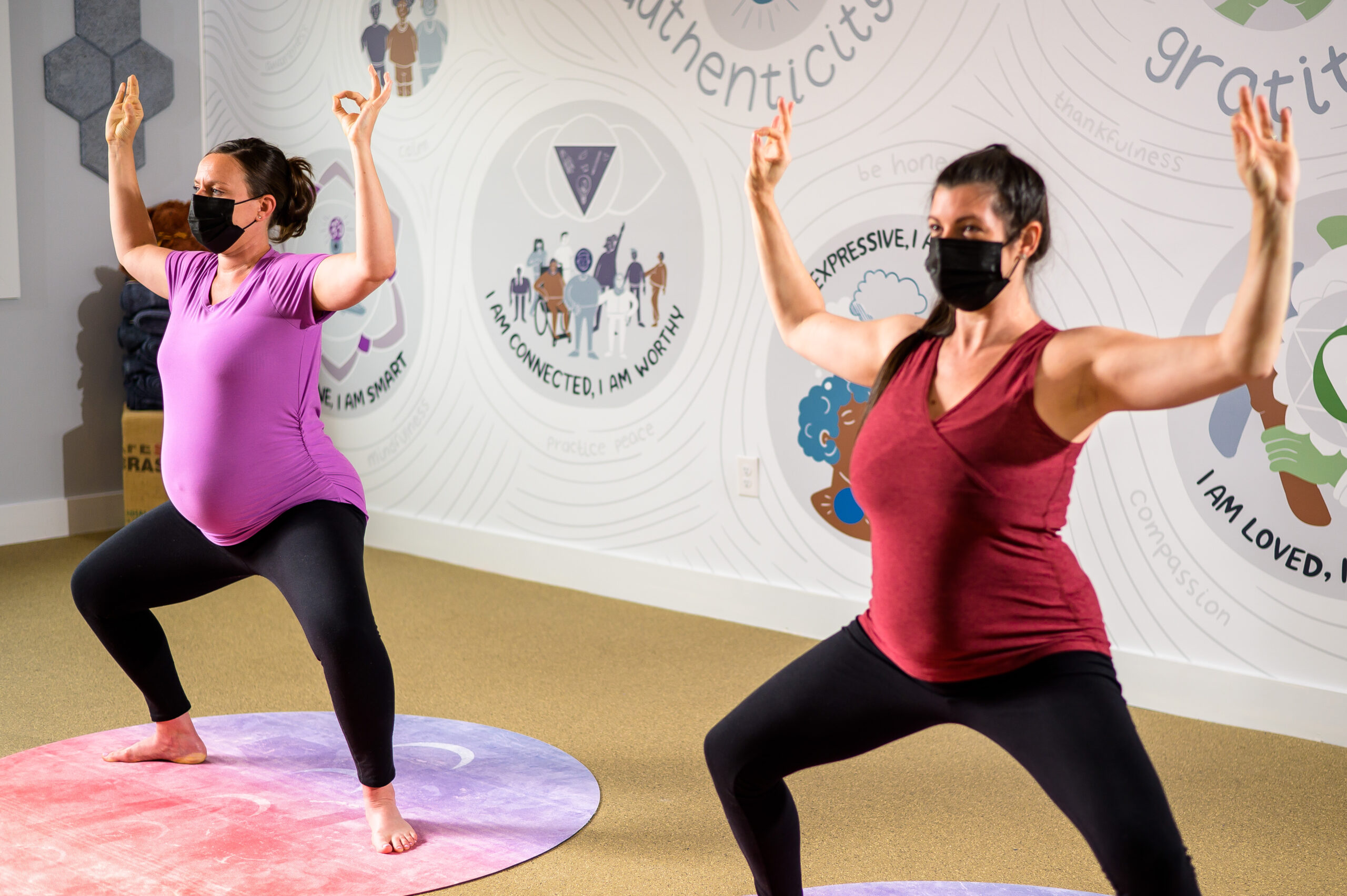Adapting Traditional Yoga Practices for Pregnancy and Postpartum
Yoga is a valuable practice that offers numerous physical, emotional, and psychological benefits. It also provides a safe and supportive environment to adapt traditional methods to the unique needs of pregnancy and postpartum. This blog post explores why pregnant and recent birthing individuals should consider a pre- or postnatal yoga class over a regular adult yoga class, emphasizing the unique benefits and adaptations that are essential during each phase.
Benefits of Prenatal Yoga
Prenatal yoga offers a range of benefits tailored to the needs of pregnant individuals.
A regular practice can help improve sleep patterns, which can be disrupted during pregnancy. The breathing exercises and mindfulness practices in prenatal yoga can also significantly reduce stress and anxiety levels. Pregnant women practicing yoga showed lower levels of cortisol, the stress hormone, and reported lower anxiety levels compared to those who did not practice yoga.
Prenatal yoga strengthens the muscles needed for childbirth, including the pelvic floor, which can ease the birthing process and aid in postpartum recovery. It can also help alleviate common pregnancy-related discomforts such as lower back pain, nausea, and headaches.
Benefits of Prenatal Yoga by Trimester
Gentle, restorative yoga poses can help alleviate nausea and reduce fatigue, which are common in the first trimester.
As the body begins to adapt to the growing baby, poses that strengthen and stretch can help with common discomforts like an achy back. Therefore prenatal yoga is effective in reducing back pain and improving physical function during the second trimester.
Poses that open the hips and strengthen the pelvic floor are particularly beneficial as the body prepares for labor in the third trimester. Meditation and breathing techniques become crucial for managing labor pain and stress.
Mind-body interventions focusing on relaxation and gentle stretching can help manage pregnancy symptoms as well as enhance pain tolerance, reducing the perception of pain during childbirth.
Preparation for not only Birth, but also Postpartum
Prenatal yoga not only prepares the body for childbirth by strengthening and stretching essential muscles but also prepares the mind. The mindfulness and relaxation techniques learned in prenatal yoga can be invaluable during labor and delivery. Prenatal yoga improves pain tolerance and reduces the perception of pain during childbirth. Additionally, understanding how to adapt your yoga practice postpartum can aid in recovery and help manage the physical changes that come with parenthood, as well as reduce symptoms of postpartum depression. Also see 3 Gentle Postpartum Yoga Poses for Core Strength.
Safety and Adaptation
Prenatal yoga is specifically designed to accommodate the physiological changes that occur during pregnancy. Traditional yoga poses often need modifications to ensure safety and comfort. Poses that involve deep twists, intense abdominal work, or lying flat on the back for extended periods of time can be harmful during pregnancy and are generally avoided in prenatal yoga classes. Instead, prenatal yoga focuses on gentle stretches, breathing techniques, and postures that are safe and beneficial for both the birthing person and baby. In contrast, postnatal yoga poses work to help rebuild strength in the core muscles.
Community and Support
Participating in prenatal or postnatal and baby yoga classes provide an opportunity to connect with other pregnant individuals and new parents. This sense of community can be incredibly supportive, offering a space to share experiences, advice, and encouragement. This social aspect extends beyond physical health to emotional well-being. Social support during both pregnancy and postpartum is associated with better psychological health outcomes, highlighting the importance of community in these specialized yoga classes.
Parent Beginnings at Yogamazia
At Yogamazia, we emphasize the important benefits of both prenatal and postnatal yoga as part of our commitment to maternal wellness education.
Our yoga classes for pregnancy (Goddess) and postpartum (Little Lotus) are designed to honor and support the incredible journey of pregnancy, meeting the unique needs to help expectant persons create space for baby while embracing the changes in the body in preparation for the postnatal period.
Our instructors are trained specifically in prenatal and postpartum yoga, ensuring that each class is safe and beneficial for pregnant individuals and parents who recently birthed, providing modifications and guidance tailored to each stage. We also offer a holistic approach that includes not only physical yoga practice but also incorporating breathing, mindfulness & visualization techniques alongside educational resources on pregnancy, childbirth and beyond.
Our goal is to support you in every aspect of your journey and foster a supportive community to connect, share experiences, and find encouragement; this sense of belonging is integral to our values of G.R.A.C.E. Embrace our Parent Beginnings at Yogamazia, because your family deserves a nurturing start.
References
Beddoe AE & Lee KA (2008). Mind-body interventions during pregnancy. Journal of Obstetric, Gynecologic & Neonatal Nursing, 37(2), 165-175.
Beddoe AE, Paul Yang C-P, Kennedy HP, et al. (2009). The effects of mindfulness-based yoga during pregnancy on maternal psychological and physical distress. Journal of Obstetric, Gynecologic & Neonatal Nursing, 38(3), 310-319.
Chuntharapat S, Petpichetchian W, & Hatthakit U. (2008). Yoga during pregnancy: Effects on maternal comfort, labor pain, and birth outcomes. Complementary Therapies in Clinical Practice, 14(2), 105-115.
Field T, Diego M, Delgado J, et al. (2013). Yoga and social support reduce prenatal depression, anxiety, and cortisol. Journal of Bodywork and Movement Therapies, 17(4):397-403.

July 2, 2024
website design by grit & grace design studio
Copyright 2020-2026. Yogamazia LLC DBA Smart Parenting with Michelle- All Rights Reserved. Yogamazia is registered in the U.S. Patent and Trademark Office by Yogamazia LLC.
DISCLAIMER
terms of use | privacy policy